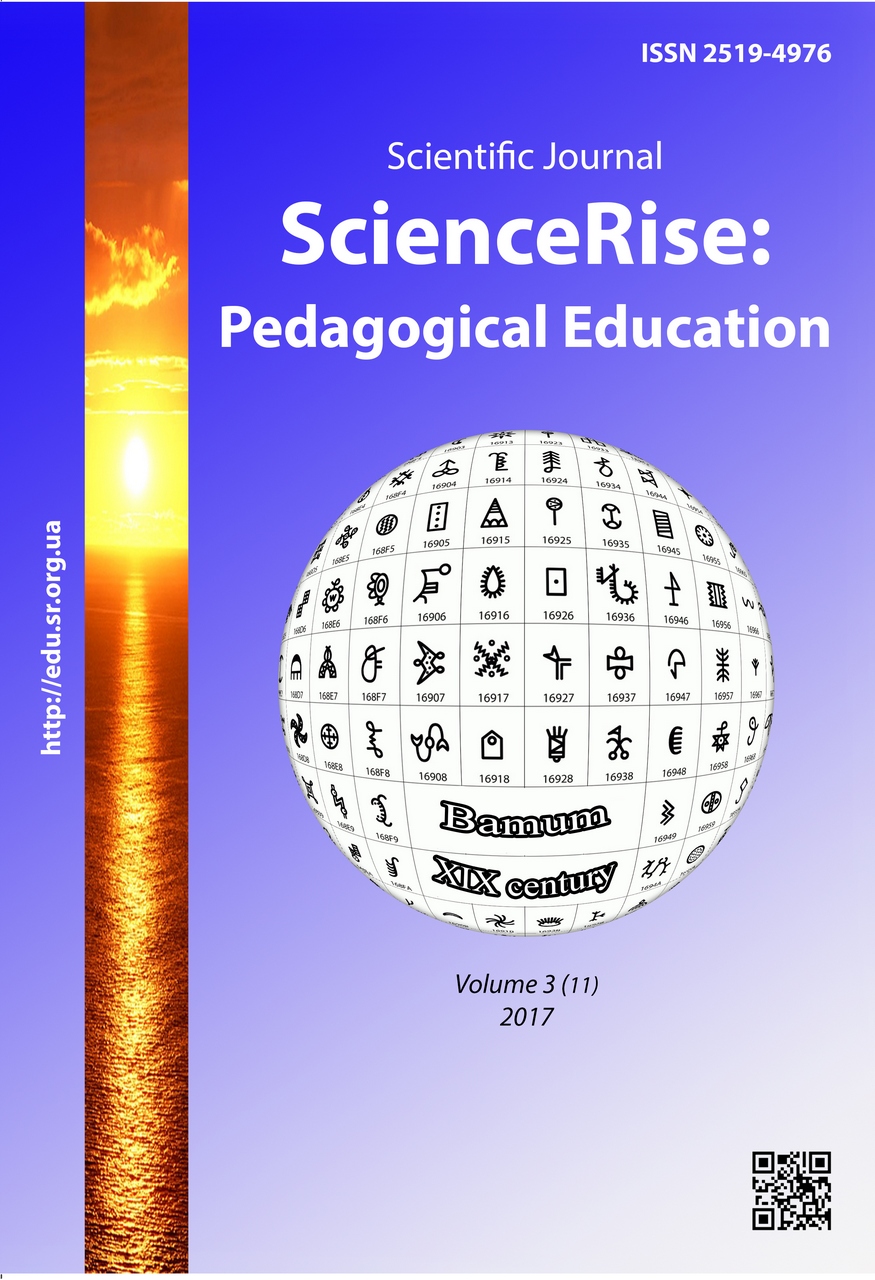Developing features of self-educational competence for students of medical college
DOI:
https://doi.org/10.15587/2519-4984.2017.97241Keywords:
self-education competence, student, medical college, criterion, parameter, formation levelAbstract
The features of self-educational competence formation of students of medical colleges were analyzed in the article. The methods of diagnostics of criteria of self-educational competence of future specialists were presented. The main motivations of students’ entrance to medical college, their importance in formation of self-educational competence were elucidated. The initial level of knowledge of natural school disciplines was determined. The directions of formation of self-educational competence in students of medical college were outlined. The aim of research is to elucidate the features of self-educational competence of students of medical colleges by revelation and analysis of motives hierarchy of students’ learning. For studying the motives of entrance to medical college, the first year students were interrogated using the questionnaire “Motivation of study in educational institution”. The analysis of the results, received by this method, demonstrates that most students chose the motive “to get a diploma”. It was also revealed, that the level of interest to the natural-scientific disciplines is insufficient. That is why certain arrangements, directed on integral understanding of reality and advantages of own specialty and acquisition of abilities and skills of self-educational competence, must be realized. So, the modern professional education must provide the fast movement to self-education. The solution of this problem is closely connected with modernization of the content of professional education, with optimization of methods and technologies of organization of educational process, reinterpretation of its result
References
- Dovmantovych, N. G. (2013). To the problem of using the competence approach at medical college. Pedagogical process: theory and practice, 2, 38–44.
- Dovmantovich, N. (2016). The structure of self-educational competence for students of medical college. IntellectualArchive, 5 (2), 128–133.
- Koryl, O. A. (2012). Formuvannya samoosvitnyoi kompetentnosti u studentiv nemovnyh special`nostey z vykorystannyam informatsiyno-komunikatsiynyh tehnologiy [Self-educational competence formation of the students of technical specialties using the informational technologies]. Chernihiv, 25.
- Dobryden, A. (2010). Formuvannya samoosvitnyoi kompetentnosti maybutnyogo vchytelya zasobamy integratyvnogo navchannya [Self-educational competence formation for the future teacher my integration teaching tool]. Problemy pidgotovky suchasnogo vchytelya, 1, 59–64.
- Shcholok, О. B. (2006). Informational and learning environment as a factor in the formation of future professional competence in the process of self-education. Pedagogical science, 43, 366–370.
- Kiselyova, A. B. (2011). Formation of self-educational competence of future teachers in terms of informational and learning environment. Kharkiv, 22.
- Bukhlova, N. V. (2006). Learning to learn: diagnosis and formation of self-educational competence of students. Kyiv: Vyd. dim «Shkilnyi svit», 128.
- Ilyin, E. P. (2002). Motivation and motives. Saint Petersburg: Pyter, 512.
- Vylenskyy, M. J., Obraztsov, P. I., Uman, A. I.; Slastenyn, V. A. (Ed.) (2002). Technologies of professionally-oriented learning in school High society. Moscow: Pedagogic society of Russia, 275.
- Aleksiuk, A. N., Pidkasistyj, P. Y. et. al. (1993). Organization of independent work of students in the conditions of an intensification of training. Kyiv: UMKVO, 336.
Downloads
Published
How to Cite
Issue
Section
License
Copyright (c) 2017 Nataliya Dovmantovych, Mariіa Dovmantovych

This work is licensed under a Creative Commons Attribution 4.0 International License.
Our journal abides by the Creative Commons CC BY copyright rights and permissions for open access journals.
Authors, who are published in this journal, agree to the following conditions:
1. The authors reserve the right to authorship of the work and pass the first publication right of this work to the journal under the terms of a Creative Commons CC BY, which allows others to freely distribute the published research with the obligatory reference to the authors of the original work and the first publication of the work in this journal.
2. The authors have the right to conclude separate supplement agreements that relate to non-exclusive work distribution in the form in which it has been published by the journal (for example, to upload the work to the online storage of the journal or publish it as part of a monograph), provided that the reference to the first publication of the work in this journal is included.







